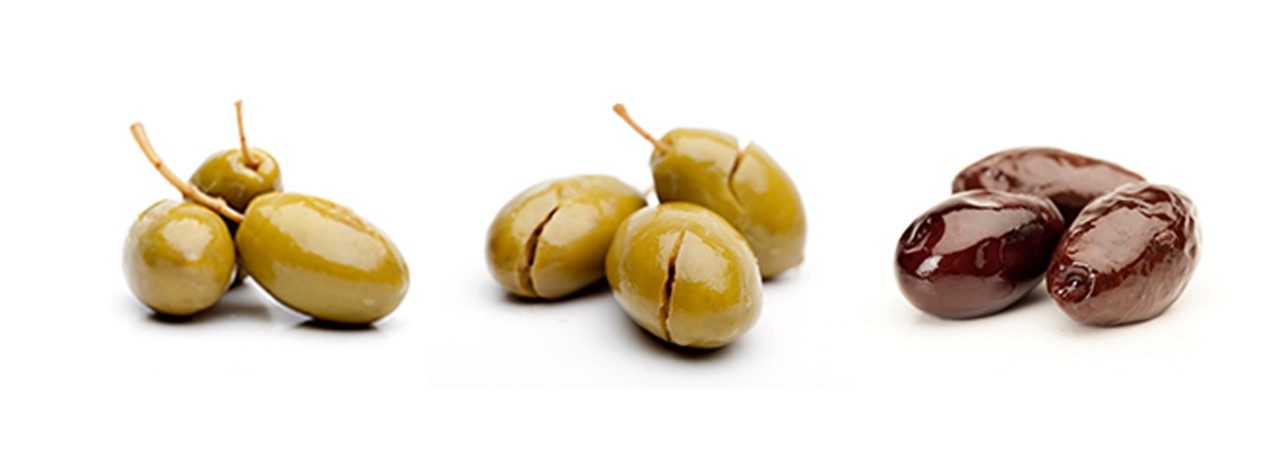.png.transform/rendition-xs/image_image%20(1).png)
Aceituna de Mallorca PDO
They are table olives from the native Majorcan variety, partially fermented in brine. The Aceituna de Mallorca / Aceituna Mallorquina / Oliva de Mallorca / Oliva Mallorquina Protected Designation of Origin covers three variants of the same olives: green, split green and natural black. The split green olives are flavored with fennel and chili, and Majorcan olive oil is added to the natural black olives.
The degree of ripeness, together with the preparation process, especially seasoning and flavoring, enables the three types of presentation to be obtained.
Tasting notes
Mallorquina variety presents the following organoleptic characteristics:
- Form: fusiform, mildly asymmetric, round apex and without nipple. In most cases with little lenticels.
- Size: small.
- Colour: green, yellowish green or brown-black depending on degree of ripening.
- Appearance: shiny.
- Pulp: scarcely adhered to stone (floating stone).
- Flavour: predominantly bitter.
- Pulp touch sensation: unctuous.
Other notes
Unsaturated fatty acids: ≥ 83% of total fatty acids
Oleic acid + linoleic acid: ≥ 78% of total fatty acids
Total polyphenols: ≥ 245 mg of gallic acid/100 g.
Suitability for storage: excellent.
Production / Processing method
In terms of farming, harvesting is done manually and in stages. Staged harvesting for whole green olives and split green olives takes place before coloration and after coloration for natural black olives. This allows the olives to ripen on the tree, giving each of the three kinds a series of distinctive and characteristic organoleptic properties. Manual harvesting by experienced farmworkers ensures that the organoleptic properties of the fruit are at their peak and is responsible for the typical firmness of both the whole green and the split green olives.
Production, preparation (selection, washing, splitting, salting and seasoning) of the olives protected under the Designation of Origin is all done on the island of Majorca. Distinguishing features of the preparation process are that the split green olives are given traditional seasoning using fennel and chili pepper grown on the island, giving them their characteristic aroma. The Majorcan olive oil used in the traditional seasoning for the natural black olives increases their characteristic unctuousness. Lastly, the absence of treatment with alkalines results in little change to the natural texture of the olives, ensuring that both the whole green and the split green olives keep their firmness and typically bitter flavor.
Geography / Relief and climate
Farming land suitable for growing the olives included under the Protected Designation of Origin consists of limey soil of medium to strong consistency, with a high proportion of bulky matter and a largely alkaline pH. The soil is also very stony, providing good drainage. The olive trees are generally grown on terraces that follow the contours of the land. The terraces face south, making the most of the gradient and exposing the trees to as much sunshine as possible, avoiding the cold northerly winds. The steep terrain means that the olives have to be harvested manually, enabling only the best to be selected. The trees get their water from rainfall alone.
The weather is typically Mediterranean, with many hours of sunshine, warm to cold winters and dry, hot summers. The soil has a high calcium carbonate content (limey).
Regulatory Council
Consejo Regulador de la DOP Aceituna de Mallorca
C/ Babieca, n. 2
07198 Son Ferriol
Tel.: (+34) 871 030 769
comunicacio@olivademallorca.es
www.olivademallorca.es
Sources:
- Spanish Ministry of Agriculture
The absence of treatment with alkalines results in little change to the natural texture of the olives.


- Aceituna de Mallorca 1
- Aceituna de Mallorca 2

Palma de Mallorca (Balearic Islands)
